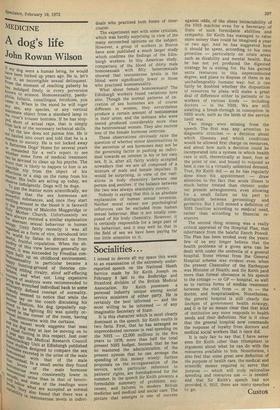Socialities
I intend to devote all my space this week to an examination of the extremely underreported speech on the National Heath Service made by Sir Keith Joseph on February 8 last to the Redbridge and Stratford division of the British Medical Association. Sir • .Keith possesses a personal industry unique among social service ministers of either party. He is certainly the best informed — and the most willing to be informed — of any imaginable Secretary of State. It is this character which is most clearly dominant in the speech. Sir Keith exults in two facts. First, that he has arranged an unprecedented increase in real spending on the 'NHS — £2,000 millions in the five years to 1976, more than half the total present NHS budget. Second, that he has so mastered the administration of the present system that he can arrange the spending of this money wisely: further proposals on the re-organisation of the service, with particular reference to patients' rights, are foreshadowed for the summer. In the speech Sir Keith presents a formidable summary of problems, successes, and failures in modern British medicine and medical and social care. The picture that emerges is one of success against odds, of the sheer intractability of the NHS machine even for a Secretary of State of such formidable abilities and sympathy. Sir Keith has managed to raise more money than could be imagined a year or two ago. And he has suggested how it should be spent, according to his own priorities — particularly on crisis areas such as disability and mental health. But he has not yet produced the digested strategy he is aiming for. He has gained extra resources to this unprecedented degree, and plans to dispose of them in an unchallengeably humane way: but it can fairly be doubted whether the disposition of resources he plans will make a great deal of difference either to patients or to workers of various kinds — including doctors — in the NHS. We are still awaiting a break-through in conception in NHS work, such as the birth of the service itself was.
Two things were missing from the speech. The first was any attention to diagnostic criticism — a decision about which illnesses and which conditions would be allowed first charge on resources, and about how such a decision could be incorporated into a system in which health care is still, theoretically at least, free at the point of use, and bound to respond as best it can to a virtually unlimited demand. True, Sir Keith did — as he has regularly done since his appointment — draw attention to the fact that acute illness is much better treated than chronic under out present arrangements, even allowing for a small failure on his part to distinguish between gerontology and geriatrics. But I still missed a definition of NHS function according to medical need, rather than according to financial resources.
The second thing missing was a really critical appraisal of the Hospital Plan, that inheritance from the baleful Enoch Powell. The Plan has been eroded over the years: few of us any longer believe that the health problems of a given area can be dealt with under the umbrella of a general hospital. Some retreat from the General Hospital scheme was evident even when the present Chancellor of the Exchequer was Minister of Health; and Sir Keith paid more than formal obeisance in his speech to the cottage — or GP — hospital, as well as to various forms of median treatment between the visit from — or to — the doctor, and hospitalisation. Nonetheless, the general hospital is still clearly the linchpin of government health strategy, and it is by no means clear that that kind of institution any more responds to health needs and their definition. Nor is it clear that the general hospital now commands the response of loyalty from doctors and medical social workers that it once did.
It is only fair to say that I. have never seen Sir Keith other than triumphant in argument about what he can do with the resources available to him. Nonetheless, I also feel that some great new definition of the purpose of health care, the medical and scientific means required to serve that purpose — which will truly rationalise spending and resources use — is needed: and that Sir Keith's speech had not provided it. Still, there are many speeches to go. CUStOS










































 Previous page
Previous page